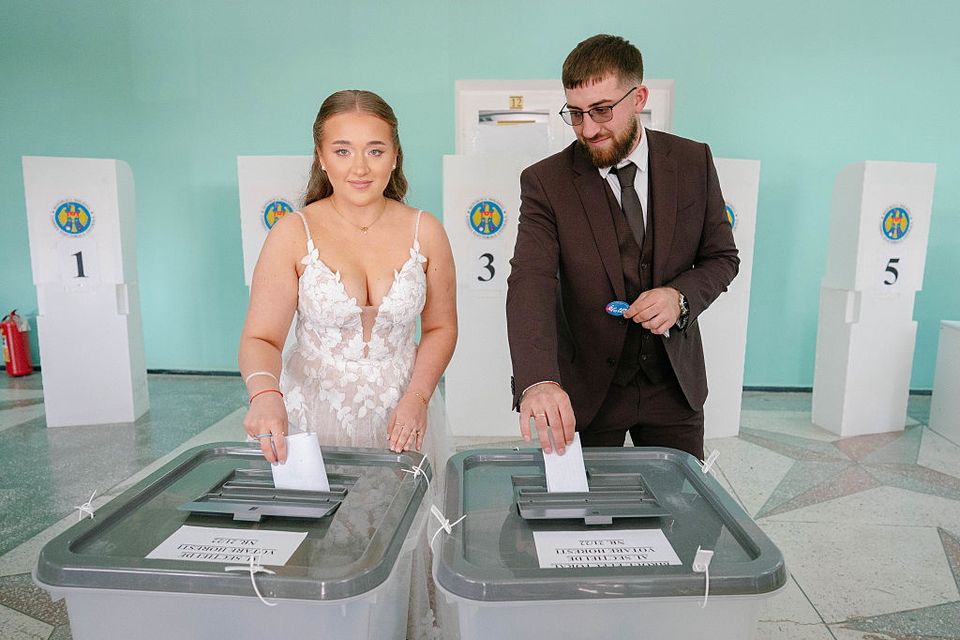World
Moldovans Vote in Crucial Election Amid Claims of Russian Interference

Moldova held a pivotal parliamentary election on March 10, 2024, as voters cast their ballots amidst allegations of Russian interference. The outcome of this election is crucial for Chisinau’s efforts to strengthen ties with the European Union. Hours before polls closed, the ruling pro-European Party of Action and Solidarity (PAS) and the opposition, aligned with Russia, exchanged accusations of electoral misconduct.
President Maia Sandu has characterized this election as a defining moment for Moldova, a nation that has historically navigated between European aspirations and Russian influence. The PAS is determined to maintain its majority in the 101-seat parliament, while the Russian-friendly Patriotic Bloc aims to disrupt this momentum and redirect the country’s course away from Brussels.
Government officials have expressed concerns regarding attempts to undermine the election, including cyber attacks targeting electoral infrastructure and false bomb threats at polling stations located abroad. The Moldovan diaspora, which generally supports European integration, is anticipated to play a significant role in the election outcome. Votes from this group will be counted after polling stations close at 21:00 local time (18:00 GMT).
The election comes at a time of considerable political uncertainty for Moldova, which has faced challenges stemming from the ongoing war in neighboring Ukraine, persistent allegations of Russian meddling, and a fragile economy. The air of calm in Chisinau, particularly in the city’s quieter areas, contrasted sharply with the serious allegations being exchanged.
In the lead-up to the election, Stanislav Secrieru, national security adviser to President Sandu, indicated that officials anticipated an escalation of cyber attacks on the Central Electoral Commission and other government entities, allegedly orchestrated from multiple countries. He noted that voting stations in cities such as Rome, Brussels, and the United States received bomb threats, suggesting an organized effort by Russia and its affiliates to disrupt the electoral process.
Moscow has denied any involvement, accusing the Moldovan government of fostering anti-Russian sentiment to galvanize voter support. On election day, Igor Dodon, co-leader of the Patriotic Bloc and former president, called for protests outside parliament, alleging that Sandu intended to annul the election results without presenting any evidence.
The ruling government has consistently warned about a concerted Russian campaign to manipulate the electoral outcome. Earlier in the week, authorities disqualified two pro-Russian parties from the ballot due to allegations of illegal financing, which followed extensive raids targeting illicit campaign funding and purported Russian-backed operations aimed at inciting unrest.
Both the ruling party and the opposition have tapped into public sentiment regarding economic difficulties, which have been exacerbated by ongoing disinformation campaigns. Inflation remains a persistent issue, hovering around 7%, while citizens also grapple with rising costs for imported energy.
Should the PAS lose its majority, it may need to seek alliances with opposition parties such as the centre-left Alternative bloc or the populist Our Party, provided they meet the threshold for parliamentary representation.
As the election unfolded, voters shared their perspectives on Moldova’s path forward. Viorica Burlacu, a fruit seller in Chisinau, expressed her desire for European protection, citing the war in Ukraine as a concern. “We’re afraid of war; no one wants that,” the 46-year-old said, emphasizing the need to reach out to Europe for security.
Conversely, in the northern city of Balti, 82-year-old Maria Scotari reflected on a different era, remembering her satisfaction as a student during the Soviet Union. “What was so bad about it? That’s how life was. I was a student, everything was fine, everything was great,” she recalled.
As the results begin to emerge, the implications of this election will not only shape Moldova’s immediate political landscape but could also influence its long-term trajectory in the context of European integration and regional stability.
-

 Top Stories3 months ago
Top Stories3 months agoTributes Surge for 9-Year-Old Leon Briody After Cancer Battle
-

 Entertainment4 months ago
Entertainment4 months agoAimee Osbourne Joins Family for Emotional Tribute to Ozzy
-

 Politics4 months ago
Politics4 months agoDanny Healy-Rae Considers Complaint After Altercation with Garda
-

 Top Stories4 months ago
Top Stories4 months agoIreland Enjoys Summer Heat as Hurricane Erin Approaches Atlantic
-

 World5 months ago
World5 months agoHawaii Commemorates 80 Years Since Hiroshima Bombing with Ceremony
-

 Top Stories3 months ago
Top Stories3 months agoNewcastle West Woman Patricia Foley Found Safe After Urgent Search
-

 Top Stories5 months ago
Top Stories5 months agoFianna Fáil TDs Urgently Consider Maire Geoghegan-Quinn for Presidency
-

 World5 months ago
World5 months agoCouple Convicted of Murdering Two-Year-Old Grandson in Wales
-

 World5 months ago
World5 months agoGaza Aid Distribution Tragedy: 20 Killed Amid Ongoing Violence
-

 World5 months ago
World5 months agoAristocrat Constance Marten and Partner Convicted of Infant Murder
-

 Top Stories4 months ago
Top Stories4 months agoClimbing Errigal: A Must-Do Summer Adventure in Donegal
-

 Top Stories4 months ago
Top Stories4 months agoHike Donegal’s Errigal Mountain NOW for Unforgettable Summer Views









